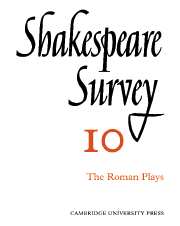Book contents
- Frontmatter
- Shakespeare’s Roman Plays: 1900–1956
- Shakespeare’s ‘Small Latin’—How Much?
- Shakespeare and the Elizabethan Romans
- The Metamorphosis of Violence in Titus Andronicus
- From Plutarch to Shakespeare: A Study of Coriolanus
- The Composition of Titus Andronicus
- Classical Costume in Shakespearian Productions
- Shakespeare’s Use of a Gallery over the Stage
- Lear’s Questions
- “Egregiously an Ass”: The Dark Side of the Moor. A view of Othello’s Mind
- Shakespeare in Schools
- Shakespeare Festival, Toronto, Canada
- International Notes
- Shakespeare Productions in the United Kingdom: 1955
- Drams of Eale, A Review of Recent Productions
- The Year's Contributions to Shakespearian Study 1 Critical Studies
- 2 Shakespeare’s Life, Times and Stage
- 3 Textual Studies
- Books Received
- Index
- Plate Section
2 - Shakespeare’s Life, Times and Stage
Published online by Cambridge University Press: 28 March 2007
- Frontmatter
- Shakespeare’s Roman Plays: 1900–1956
- Shakespeare’s ‘Small Latin’—How Much?
- Shakespeare and the Elizabethan Romans
- The Metamorphosis of Violence in Titus Andronicus
- From Plutarch to Shakespeare: A Study of Coriolanus
- The Composition of Titus Andronicus
- Classical Costume in Shakespearian Productions
- Shakespeare’s Use of a Gallery over the Stage
- Lear’s Questions
- “Egregiously an Ass”: The Dark Side of the Moor. A view of Othello’s Mind
- Shakespeare in Schools
- Shakespeare Festival, Toronto, Canada
- International Notes
- Shakespeare Productions in the United Kingdom: 1955
- Drams of Eale, A Review of Recent Productions
- The Year's Contributions to Shakespearian Study 1 Critical Studies
- 2 Shakespeare’s Life, Times and Stage
- 3 Textual Studies
- Books Received
- Index
- Plate Section
Summary
In an article castigating those modern critics who wish to interpret Shakespeare’s tragedies in Christian terms and to see Othello and Lear in particular saved, Sylvan Barnet observes that to extend the lives of characters beyond the play into the next world is just as much an error as the old fault of reconstructing their career before the play begins; he continues:
Shakespeare presents such full worlds that it is possible with a little ingenuity and effort to find in him almost any theory which the researcher wishes to discover.
If it is possible to discern a devout Shakespeare, it is also possible to shape out a pagan Shakespeare, or even, according to Paul Arnold, a Rosicrucian Shakespeare. He believes that in Esotérisme de Shakespeare he is revealing for the first time the true meaning of the last plays and several comedies, as expressions of a cabalistic philosophy, which, it seems, was the major preoccupation of the Elizabethan élite, and the sole genuine interest of all the poets and dramatists.
- Type
- Chapter
- Information
- Shakespeare Survey , pp. 143 - 150Publisher: Cambridge University PressPrint publication year: 1957

